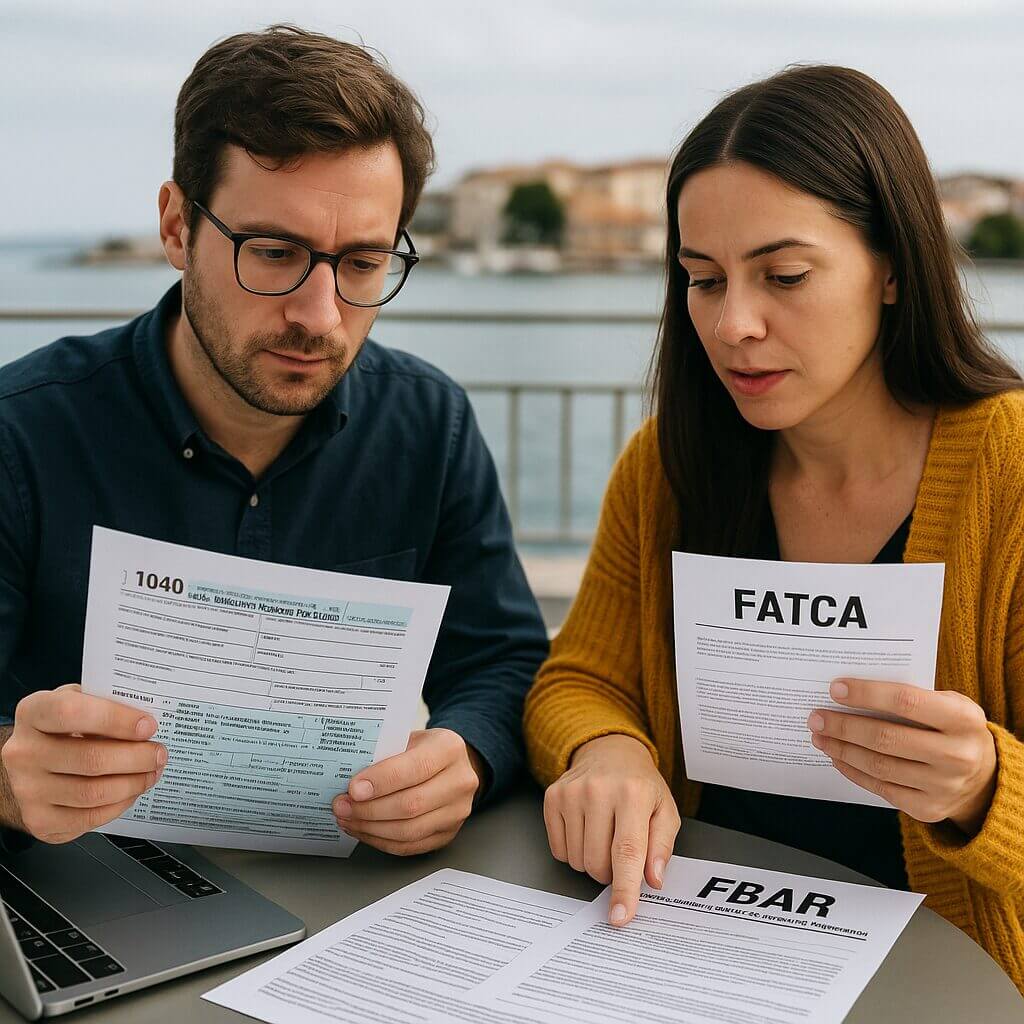File U.S. taxes from overseas with confidence. FEIE/FTC, FBAR & FATCA handled by Enrolled Agents. Flat-fee, secure portal, global clients.
Expat Tax Services: A Complete Guide for Americans Living Abroad



Living abroad comes with excitement and new experiences – but if you’re a U.S. citizen or green card holder, it also comes with ongoing tax responsibilities back home. The United States is one of the few countries that taxes its citizens on worldwide income, regardless of where they live (you must file U.S. tax returns even while overseas). For context, an estimated 5.5 million Americans live abroad, from London to Singapore to Costa Rica – and all of them face the question of how to handle their U.S. taxes from overseas. If you feel confused or overwhelmed by this, you’re not alone. The good news is that with the right guidance, managing your expat tax services needs can be far simpler and stress-free.
In this guide, we’ll break down who needs expat tax help, what key filing obligations you have (like the 1040, FBAR, and FATCA), common challenges U.S. expats encounter, special IRS programs to get caught up if you’re behind, and why working with an expat tax accountant can save you headaches. Throughout, our tone is professional, clear, and empathetic – because at Zisman Tax, we understand the unique worries of Americans abroad and are here to help you navigate U.S. taxes with confidence.

Who Needs Expat Tax Services?
If you’re a U.S. citizen or green card holder living outside the United States, you likely need expat tax services. The obligation to file U.S. taxes isn’t limited by geography – whether you moved abroad for work, retirement, family, or adventure, the IRS still expects a yearly filing. Many people are surprised by this reality. Maybe you’ve been teaching English in Japan, working remotely from Portugal, or running a business in Australia – if you carry U.S. citizenship or residency, you carry U.S. tax duties too. Beyond citizens abroad, certain other individuals also benefit from expat-focused tax help, including:
- Accidental Americans and dual citizens: Those who were born in the U.S. (or born to American parents) and now live abroad might not realize they are required to file U.S. returns. Expat tax services help clarify these obligations.
- Non-residents with U.S. income: If you’re not an American but you earn U.S.-sourced income (for example, from a U.S. rental property or investment) while living overseas, you have special filing needs too. An expat tax professional can assist with the required non-resident returns and treaty benefits.
- Americans behind on their taxes: Perhaps you’ve lived abroad for years and weren’t aware you needed to file U.S. taxes, or you fell behind. Expat tax services are essential for catching up safely and taking advantage of IRS amnesty programs (more on that below).
- Anyone overwhelmed by international tax rules: U.S. taxation for expats involves extra forms and laws (FBAR, FATCA, foreign business reporting, etc.) that can be confusing. If terms like “foreign bank account reporting” or “totalization agreement” make your head spin, it’s a sure sign you could benefit from a dedicated expat tax accountant’s help.
In short, taxes for expats are not just a DIY project. If you’re navigating earnings or assets across borders, professional expat tax services can be the difference between a smooth filing experience and a compliance nightmare. They ensure you understand your obligations and help you avoid costly mistakes.
Key U.S. Tax Filing Obligations for Expats
What exactly must an American abroad file? U.S. expat tax obligations generally include all the same forms a stateside taxpayer files, plus a few additional foreign reporting requirements. Here are the key filings and forms to know about:
- Annual Income Tax Return (Form 1040): Every year, U.S. citizens and resident aliens abroad must file a Form 1040 tax return reporting their worldwide income. This is the core tax return where you declare income from all sources – whether it’s a salary from a job in Paris, self-employment earnings from a consultancy in Dubai, or investment income from back home. Many expats qualify for special provisions like the Foreign Earned Income Exclusion (which can exclude over $100,000 of foreign wage income) or the Foreign Tax Credit (to credit taxes paid to other countries), but you only get these benefits by filing your U.S. return and electing them. Even if you owe $0 after exclusions and credits, the filing requirement generally still applies if your income is above the standard threshold.
- FBAR – Foreign Bank Account Report (FinCEN Form 114): If you have foreign financial accounts whose aggregate value exceeded $10,000 at any point in the year, you must file an FBAR. This annual report, separate from your tax return, discloses overseas bank accounts, brokerage accounts, or even certain foreign retirement accounts. The FBAR is filed online through the Treasury’s FinCEN system (not to the IRS, despite often being mentioned alongside taxes). Failing to report accounts can trigger steep penalties, so it’s crucial for expats with savings or business accounts abroad to file this on time – even if the accounts produce no taxable income.
- FATCA Form 8938 (Statement of Specified Foreign Financial Assets): Under the Foreign Account Tax Compliance Act (FATCA), many expats also need to include Form 8938 with their 1040. This form overlaps with the FBAR but has different thresholds and is filed to the IRS as part of your return. For example, a married couple living abroad must file Form 8938 if their foreign financial assets total over $400,000 on the last day of the year (or $600,000 at any point during the year) – the thresholds are lower for singles or those back in the U.S. The form covers foreign accounts, as well as other assets like foreign stock or interests in foreign companies. Like the FBAR, it’s an informational report (no extra tax by itself) but failing to file can lead to penalties. An expat tax accountant will help determine if your asset levels trigger FATCA reporting.
- State Tax Returns (if applicable): Moving overseas doesn’t always free you from state income tax. If you maintained ties to a high-tax state (such as California or New York) and have not clearly cut residency, that state might still consider you a tax resident. This is a tricky area – rules vary by state – but expats need to be mindful. You may need to file a state return until you’ve changed your domicile officially. Part of expat tax planning is ensuring you don’t accidentally remain taxable in a state due to a home address, voter registration, or property kept there.
- Other foreign informational forms: Depending on your financial situation, there could be additional filing requirements. For example, if you own part of a foreign corporation or LLC, you may need to file Form 5471 or other foreign entity ownership reporting forms each year. If you received a large gift or inheritance from a foreign person, you might need Form 3520. Have a foreign pension or trust? Those can trigger forms and disclosures too. These forms don’t necessarily mean extra tax, but the IRS wants the information – and missing a required international information form can result in penalties. A comprehensive expat tax service will ask about these situations to make sure all your bases are covered.
One bit of good news: as an expat, you get a timing break. The IRS automatically grants U.S. persons overseas an extra two months to file their 1040 (your deadline is June 15 instead of April 15). This is a buffer recognizing that getting documents from abroad can take time. However, if you owe tax, interest still accrues from April, so many expats pay by April to avoid interest and then finalize the return by June. You can also file an extension until October 15 if needed. These extended deadlines give some breathing room, but don’t be lulled into complacency – it’s still critical to meet the requirements, just with a slightly longer runway.

Common Challenges for Americans Filing Taxes Abroad
Filing U.S. taxes from overseas can present a host of challenges that domestic taxpayers never encounter. Here are some of the most common pain points expats face – and why a specialized approach is often essential:
- Double Taxation Worries: The biggest concern for most expats is “Will I be taxed twice?” – once by my country of residence and again by the U.S. This fear is understandable. Without using provisions like the Foreign Earned Income Exclusion or foreign tax credits, double taxation can indeed occur. For example, if you work in Germany and pay German taxes, you don’t want to also pay the IRS on the same income. Navigating the U.S. rules to avoid double taxation (and figuring out whether the exclusion, a tax credit, or both make sense for you) can be complex. One misstep could mean paying more tax than necessary. This is where an expert can ensure you’re not leaving money on the table or accidentally overpaying.
- Foreign Account Reporting & Complex Forms: Many expats are unaware of the additional reporting required for foreign financial accounts and assets. It’s all too common that someone will live abroad for years before learning about FBAR or FATCA forms – sometimes only after a scare or a fellow expat mentions it. The complexity of these forms is a challenge in itself: gathering all your foreign account numbers, highest balances, addresses of foreign banks, etc., can be tedious. And the terminology might be unfamiliar (what exactly counts as a “foreign financial asset”? Do you need to report your foreign life insurance or your local retirement fund?). The stakes are high because the penalties for missing these forms are severe. This challenge is exactly why expat tax services exist – to take that burden off your shoulders and ensure compliance.
- Currency Conversion and Recordkeeping: Dealing with multiple currencies adds another layer of difficulty. The IRS demands that all amounts on your tax return be in U.S. dollars. This means if you earned €50,000 in France, you must convert that to USD at the average exchange rate or the rate on each pay date. Fluctuating exchange rates can significantly impact your reported income and deductions. Additionally, keeping proof of income and taxes paid in a foreign language or format can be hard – think of pay slips, bank statements, or receipts from countries where documents might not be in English. Organizing all that and translating financial info into IRS-ready figures is a challenge that expat taxpayers know too well.
- Local Tax Systems vs. U.S. Rules: Every country’s tax system is different, and what’s perfectly normal (or tax-free) in your host country might be taxable in the U.S. For instance, many countries don’t tax certain savings or have tax-free allowances that the U.S. doesn’t recognize. U.S. expats often get tripped up by “PFIC” rules – these apply to foreign mutual funds and can cause unpleasant tax surprises because the U.S. taxes foreign investment funds punitively. Likewise, owning a business abroad or having a stake in a foreign startup can create a minefield of U.S. reporting (Forms 5471 and others as mentioned). Even something as simple as a foreign pension or social security equivalent may be treated differently by the IRS. Without guidance, it’s easy to unknowingly violate a rule or miss out on a benefit due to differences between tax systems.
- Staying Up-to-Date and Communication Hurdles: Tax laws change frequently – for example, the Tax Cuts and Jobs Act of 2017 altered many provisions affecting expats, and each year things like exclusion amounts and deadlines adjust. When you’re far from the U.S., it can be harder to stay in the loop on these changes. Many expats also face challenges communicating with the IRS if needed (time zone differences, difficulty receiving mailed notices, etc.). If the IRS sends a letter to your old U.S. address while you’re in Bangkok, you might never see it. These hurdles make it vital to have someone watching your back. A seasoned expat tax practitioner will keep you informed of relevant changes (like new foreign income thresholds or crypto reporting rules) and can serve as a stateside point of contact if any issues arise.
All of these challenges can lead to stress and sleepless nights for expats trying to handle their taxes solo. We hear from clients all the time about the confusion and anxiety they experienced before seeking help. The U.S. tax code is complicated enough for people at home – layering on international elements multiplies that complexity. But remember, you don’t have to figure it all out alone. Identifying these challenges is the first step toward solving them, and that’s exactly what our expat tax services aim to do: address each of these pain points with expert solutions and reassuring guidance.

IRS Relief Programs for Overdue Expat Taxes
What if you’re an American abroad who hasn’t been filing U.S. taxes, possibly for years? First, know that you’re not the only one – many expats, especially those who moved abroad long ago, are only now learning they should have been filing. The IRS recognizes this, and over the years it has introduced programs to encourage non-compliant expats to come forward and get caught up voluntarily. The most well-known (and expat-friendly) option is the Streamlined Filing Compliance Procedures, often just called the “streamlined program.”
Streamlined Filing Compliance Procedures: This is essentially an amnesty program for taxpayers who failed to file U.S. returns and reports but whose non-compliance was non-willful (i.e., a mistake or oversight without intentional tax evasion). If you qualify, the IRS lets you file a limited number of past-due returns and FBARs to catch up, and importantly, they waive all late-filing and FBAR penalties. In a streamlined filing, an expat generally must:
- File the last 3 years of federal tax returns (1040s) with all required forms (including things like Form 2555 for the income exclusion or Form 8938 if applicable).
- File the last 6 years of FBARs to report foreign accounts.
- Submit a statement certifying that your previous failure to file was non-willful – basically explaining that you weren’t trying to hide income, you simply didn’t know or had a valid reason.
By doing this, you reset your compliance without facing the wrath of penalties that would normally accrue. For example, if you’ve lived in Spain since 2018 and haven’t filed anything, under streamlined you would file the tax returns for 2022, 2021, 2020 and FBARs for 2017–2022, and you’d be back in good standing. You would pay any taxes due for those years (often expats owe little to no U.S. tax after credits/exclusions), but you would not be hit with failure-to-file or failure-to-pay penalties that otherwise could apply. It’s truly a lifesaver program for expats who just didn’t know the rules or fell behind due to life circumstances.
There are some conditions – you can’t be under audit or investigation already, for instance. And if you’ve actually been willfully hiding income, then streamlined isn’t for you (there are other voluntary disclosure avenues, though those come with penalties). But for the vast majority of late-filing expats who simply made an honest mistake, the Streamlined Filing Compliance Procedures are the cleanest way to come in from the cold. Tens of thousands of taxpayers have used it since it was introduced, and it remains available as of now.
Going through the streamlined process is something you’ll want guidance on. While the IRS’s promise of “no penalties” is comforting, you need to make sure the filings are done correctly and that your certification of non-willfulness is accurate and meets IRS criteria. This is a core service we provide at Zisman Tax – helping clients safely navigate the streamlined procedure from start to finish. We prepare the back returns and FBARs meticulously, help you articulate your reasonable cause for non-compliance, and get everything submitted properly to the IRS. The peace of mind our clients feel after getting back on track (often penalty-free) is immense. They no longer have to worry about a big IRS letter showing up out of the blue.
Beyond Streamlined, note that even if you’re only one year behind or just missed an FBAR or two, it’s best to address it sooner rather than later. Sometimes simply filing the delinquent returns ASAP (before the IRS contacts you) can solve the issue. The IRS is generally more lenient on expats than on domestic filers when it comes to lateness, especially if you don’t actually owe much. There are also reasonable cause arguments that can abate penalties if you have a valid explanation for why you missed something. The bottom line is, there are paths to compliance that don’t involve massive fines – but you need to take action and likely get professional help to choose the right path.
Why Working with an Expat Tax Accountant Matters
By now it’s clear that U.S. taxes for expats involve a lot of moving parts. You might be thinking, “Do I really need an accountant, or can I figure this out myself?” While there’s no legal requirement to hire a tax professional, in our experience virtually every expat benefits from working with an expert. Here’s why partnering with an expat tax accountant is so valuable:
- Deep Expertise in Expat Tax Law: Expat-focused accountants live and breathe international tax rules. They know the latest regulations, treaty provisions, and IRS guidance specific to expats. This means they can quickly determine the best way to minimize your U.S. tax (for example, whether you should use the Foreign Earned Income Exclusion versus the Foreign Tax Credit, or both). They’ll ensure you don’t overlook deductions or elections that could save you money.
- Compliance and Peace of Mind: With a professional handling your taxes, you can rest easy that all required forms will be filed correctly and on time. No more worrying if you interpreted that FBAR question right, or whether you needed to report that foreign pension – your accountant will ask the right questions and take care of it. This dramatically reduces the risk of IRS penalties. It’s hard to put a price on the peace of mind you get knowing an expert has triple-checked everything for you.
- Efficient Problem Solving: Got a tricky situation – like you sold property overseas, or you’re a digital nomad moving through three countries a year? An expat tax accountant can devise a strategy that accounts for all those variables. They’ve likely seen similar cases and know the pitfalls to avoid. Additionally, if the IRS does send a notice or if an issue arises, you have a knowledgeable representative ready to step in and help resolve it. You’re not left dialing the IRS from abroad and sitting on hold at odd hours; your accountant can handle many communications on your behalf.
- Time Savings and Reduced Stress: Filing taxes is time-consuming at the best of times. For expats, it can turn into a major project – researching tax laws, converting currencies, filling out piles of forms. When you work with an expat tax service, much of that burden is lifted. You provide the documents and information, and we do the heavy lifting. What might take you dozens of hours (and endless frustration) on your own can be completed far more efficiently by a professional. That frees you up to focus on your job, family, and enjoying your life abroad, rather than drowning in IRS forms.
- Guidance Year-Round: A good expat tax advisor isn’t just a once-a-year form filler. We become an ongoing resource for you. Thinking of moving from one country to another? Before you go, we can advise on tax implications. Starting a side business abroad? We’ll let you know how to structure it tax-efficiently. Life is dynamic, and having an expert who understands your personal situation means you can make informed decisions that won’t come back to bite you at tax time. This kind of personalized, year-round support is something online software or a general accountant may not provide, but it’s standard with specialized expat services.
Ultimately, working with an expat tax accountant is about gaining a trusted partner. Instead of going it alone through a confusing process, you have someone to answer your questions, remind you of deadlines, and ensure everything is done right. The U.S. tax system may be complicated, but you don’t have to be the one to untangle it on your own. With professional help, you can file with confidence each year, knowing that you’re compliant and optimized. As many of our clients say, the fee for a quality expat tax service is well worth the peace of mind and the potential tax savings it yields.

The Zisman Tax Difference: Expert Help for Global Citizens
Zisman Tax is not just another accounting firm – we’re a team that specializes exclusively in U.S. expat taxation, and we’ve been doing it for over 20 years. Our approach combines big-firm expertise with boutique, personalized care. We know you have choices when it comes to handling your expat taxes, so what makes our service stand out? Here are a few key things that we believe make all the difference:
- Unmatched Expat Focus: Our experience isn’t general – it’s 100% focused on Americans abroad. Over two decades, we’ve seen it all: entrepreneurs in Europe, teachers in Asia, retirees in Latin America, digital nomads roaming the globe. This depth of experience means we anticipate issues before they arise and leverage every angle of the U.S. tax code for your benefit. U.S. expat taxes are our passion and sole focus, not a side practice.
- Boutique Service, One-on-One Support: When you work with Zisman Tax, you get a dedicated accountant assigned to you. This isn’t a call-center or a random preparer each year. Your personal CPA or IRS Enrolled Agent will get to know you and your situation in detail. Clients often tell us how much they appreciate having “their person” they can email or call directly with questions. We strive to be responsive, clear, and genuinely invested in your case – the kind of attentive service you might not find at a big impersonal firm.
- Seamless & Secure Online Process: Being thousands of miles away is not a barrier when you choose us. We’ve invested in a secure, encrypted client portal and even have a mobile app for easy document upload. From signing engagement letters to sharing tax organizers and final returns, everything can be done electronically with bank-level security. No need to mail paper across oceans. Our process is designed to be frictionless for the global client – you can upload your forms, communicate with your accountant, and review your returns all from the comfort of your home abroad. We make the logistics of tax prep as easy as online banking.
- Transparent Flat-Fee Pricing: Ever worry about hourly bills or surprise charges? We don’t do that. Zisman Tax uses flat fees for expat tax returns and services, quoted up front, so you know exactly what the cost will be. We’ll tell you the fee for your return (and any extra forms like an FBAR or business schedule) before we begin. No hidden costs, no nasty surprises. We believe in earning your trust, and a big part of that is being upfront and fair in our pricing. (Plus, our fees are often more accessible than larger competitors, while offering the same high level of expertise.)
- Proven Trust & Satisfaction: Our firm is proud to have built a strong reputation among expats worldwide. We’re honored to have received glowing reviews from clients in over 50 countries who have used our services to navigate their tax obligations. Many clients come to us after unsatisfactory experiences elsewhere, and they stay because they finally feel heard and taken care of. We measure our success not just by accurate filings, but by the relief and confidence our clients feel when they no longer have to worry about their taxes. In short, we aim to provide peace of mind along with expert tax preparation.
At Zisman Tax, we see ourselves as more than number-crunchers – we’re partners in your expat journey. Our mission is to remove the stress from U.S. taxation so you can focus on enjoying your life overseas. We keep things professional and precise, yet also personal and empathetic. We know dealing with the IRS from afar can be intimidating, so we make sure every client feels supported and informed.
Ready for some peace of mind? If you’re an American abroad feeling unsure about your taxes, we invite you to reach out. Connect with a dedicated expat tax accountant and let us simplify the complex. With Zisman Tax handling your U.S. tax matters, you can rest easy knowing an expert team has you covered – no matter where in the world you call home.

Related Expat Blog Center







